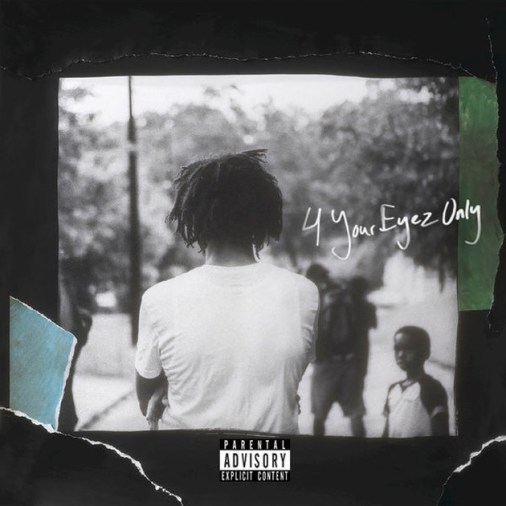“4 Your Eyez Only” By J. Cole Review
December 13, 2016
J. Cole’s highly anticipated fourth album, “4 Your Eyez Only,” was nothing short of what fans have come to expect from the lyrical and soulful genius. The North Carolina native has grown exponentially in popularity over the past couple of years and has become known as one of the most thoughtful and introspective rappers in the industry.
Kicking off the 10 track album is “For Whom the Bell Tolls,” where Cole contemplates his life in a mist of confusion. He doesn’t know where to turn and even questions if he wants to live. It quickly transitions into “Immortal,” a high energy, yet soulful beat in which Cole discusses the street life and the costs of living a life of crime. Despite these costs, he repeats how real thugs don’t die; they are immortalized in the streets.
In “Déjà vu,” J. Cole transports the listener into a crowded party, where he falls in love with a girl he sees from across the room. In this laid-back ballad, he plans out his strategy on how to get with her.
As he grows older, Cole wonders how long he can survive with his current lifestyle in “Ville Mentality.” In this song, Cole dabbles in a bit of singing, which is not typical of him. Up next, “She’s Mine, Pt. 1” sees Cole fall madly in love. He no longer wants to die, because he has something to live for now.
In “Change,” Cole talks about how grateful he is to be alive. The song shifts to a mournful sound by the end, and Cole grieves over his 22 year old friend who died in the streets.
Next up, J. Cole talks about the fruits of his success and moving to a nice neighborhood. He says that “the neighbors think I’m selling dope,” claiming that they doubt the authenticity of his wealth because of the color of his skin. The issue of racial inequality is often the topic of J. Cole songs.
Switching back to a lighter feeling, “Foldin Clothes” is an upbeat, funky song where Cole talks about settling down with his girlfriend and living a more sheltered life. He wants to “fold clothes for her,” or in other words, make life easy for her, leaving behind his dark past to make a life with her. The album then transitions into “She’s Mine, Pt. 2,” in which J. Cole revisits the same melody and chorus as Pt. 1. However, instead of talking about his lover, he professes his love for his newborn daughter. He says “you are now the reason why I fight,” recognizing and accepting his new responsibilities as a father.
The last song, “4 Your Eyez Only,” is where the story and meaning of the album all come together. J. Cole goes back and forth between his own perspective, and that of his friend, -who’s death is mentioned at the end of “Change.” Though they both have similar pasts, J. Cole differentiates his story from that of his friend. In this final ballad, Cole reveals that his friend’s dark past caught up with him in the end, and even though he had abandoned his old life and started a new one with a wife and daughter, he was unable to outrun his demons in the end. In this chilling message, it is revealed that Cole’s friend had premonitions about his own death, and felt like the time he was living on was borrowed. He knew his time was limited, so the one thing he asked was for Cole to immortalize his life on an album and share it with his daughter when she was ready, for her eyez only.
The reason this album is so beautiful is because J. Cole’s story-telling is perfectly crafted and deliberately thought out. It all comes together in the end in an “Ah-ha” moment when you realize the true meaning of the album. It is for his friend’s daughter, and all those who hear it and understand the message can appreciate the care and heart put into this work of art.


McKenna • Jan 1, 2017 at 5:52 pm
Hi, Luke,
I’m a former SDA Mustang staff writer and now an English teacher at a continuation high school. I just wanted to commend you on your prose and thoughtful analysis of this album.
I had my students analyze song lyrics at the beginning of this school year, and I think they would be pleased to see your analysis honestly voicing their own experiences of racial injustice and loss echoed throughout J. Cole’s lyrics and articulately explained in your article.
Keep on writing,
McKenna